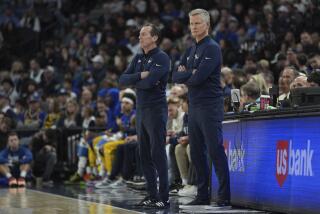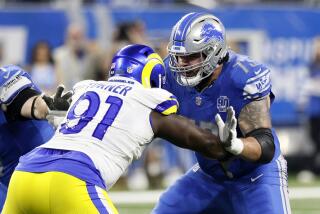Hue Jackson’s odyssey leads back to Raiders
- Share via
Reporting from Alameda — Almost three decades before becoming coach of the Raiders, Hue Jackson turned his back on NFL football.
And he was paid to do so.
Jackson, a tough but levelheaded kid from South Los Angeles, was one of those yellow-jacketed security guards at L.A. Raiders games in the 1980s. His job was to stand at field level at the Coliseum, facing away from the game, and scan the stands for unruly fans. There were plenty of those, although he concedes he was a bit halfhearted in carrying out his assignment.
“You face the crowd, make sure nobody in the crowd is throwing stuff at the players,” he recalled. “But I was looking over my shoulder trying to watch the game. It was my way of getting into the game without having to pay, without having to jump the fence.”
Jackson, 46, makes his first Southern California homecoming as a head coach Thursday when the Raiders play at San Diego. He was the quarterback of a championship team at Dorsey High, and later an assistant at USC, one of his many stops on a coaching sojourn winding through five colleges and five NFL teams.
Unvarnished ambition was Jackson’s calling card. He used to sneak into Lakers games at the Forum, liked to watch the players walk to their cars after games, and routinely talked his way into the exclusive Forum Club to hobnob with the floor-seats crowd.
“I became a familiar face, so they always let me in,” he said. “I got to know people that a lot of people didn’t get to know. Ran across Jack Nicholson, all of them. If I have a feeling that I want to go speak to people, I’d just go up and speak.”
But nowhere was Jackson more impressed than when working those Raiders games, where even he found himself tongue-tied.
“I would go to the games and be in awe of these big guys, these big crowds, how they walked out there and expected to win because they were the Raiders,” he said. “‘Autumn Wind’ was playing. Al Davis, he had L.A. by the tail.
“Nobody really talked about the Rams. It was the Raiders. They were the bullies on the block.”
That harks back to something Jackson has said repeatedly since January, when he was promoted from offensive coordinator. He has promised to “build a bully,” clearly still a work in progress as the Raiders are coming off back-to-back home thrashings by division rivals Kansas City and Denver.
In a matter of weeks, Jackson has gone from a first-time head coach to someone who seemingly wields as much personnel power as any coach in the league. He has the support of top executive Amy Trask and new owner Mark Davis, who replaced his late father, and made the bold move of trading two premium draft picks for Cincinnati quarterback Carson Palmer. Jackson followed that by signing receiver T.J. Houshmandzadeh, with whom he had worked as wideouts coach for the Bengals.
By every indication, this is Jackson’s team to mold as he sees fit, with no owner looking over his shoulder, a first for the modern-era Raiders.
And this is a onetime security guard?
“Never,” he said, when asked if, back in those days, he could have envisioned reaching this height. “For me to have lived as a young kid as a Raiders fan, looking at Al Davis from afar, and now being here as a head coach? It’s unbelievable.”
Not unbelievable to everyone. The people who knew him at Dorsey and Glendale College say Jackson showed such strong leadership qualities as a young player that they’re not surprised he’s wound up where he has.
The summer heading into his senior season at Dorsey, the school didn’t have a head coach. Jackson was part of a core group of players that held the team together, holding practices and participating in passing leagues with the players.
“In 10th grade is when we started called Huey ‘Coach’ because he started coaching everybody,” said former Dorsey receiver Aaron Cox, who went on to play at Arizona State and was a first-round pick of the L.A. Rams. “Even though we had coaches, he was always the kind of player that his knowledge of the game was far beyond his age and experience. You’d just look at him and say, ‘How do you know that?’”
Cox and Jackson became fast friends, and would spend hours on the practice field during summers, just the two of them, working on routes and pretending they were in specific pressure situations.
“He would call out a play and say, ‘OK, it’s third and 10. We’re playing Crenshaw, a night game, it’s raining and they’ve been talking trash,’” Cox said. “He’d give you all these different scenarios, then he’d call a play and say, ‘Hike!’ and I’d have to take all of that in, then go out and run the route and catch the pass. If I dropped it, he’d be on me. We did this year after year.”
When they were seniors, their 1982 team would go on to beat Locke, 13-0, to win the 3-A city league title at the Coliseum. A key play in that game was a 51-yard pass from Jackson to Cox on a seam route the two had practiced time and again.
Recalled Dorsey Coach Paul Knox, a first-year assistant on that team: “When Hue started coaching, that was kind of the talk around here that he would be a head coach one day. There was not any doubt that he would be a head coach somewhere.”
Gil Ruedaflores had the same feeling. A longtime high school and junior college coach, Ruedaflores was the head recruiter at Glendale College and convinced Jackson to play there. He saw a kid who made good decisions in a neighborhood where that wasn’t always easy to do.
“You go to Jackie Robinson Stadium and you see everybody involved in athletics,” Ruedaflores said. “Across the street you go to the projects, and there’s the drugs and the gangs. Hue was always on the Jackie Robinson Stadium side.”
As a player, Jackson went from Dorsey to Glendale College to University of the Pacific. He stayed at Pacific to begin his coaching career, then moved on to Cal State Fullerton, the World League’s London Monarchs, Arizona State, Cal, USC, before transitioning to the NFL with Washington, Cincinnati, Atlanta, Baltimore and Oakland. He never stayed anywhere longer than four seasons.
“A lot of people say there’s a problem when you go that many places,” he said. “That was never a problem. That’s how you build your resume.”
When he was with the Falcons in 2007, Jackson asked John Wooten, chairman of the Fritz Pollard Alliance, to recommend him to Davis as a potential head coach of the Raiders. The alliance is an advocacy group that promotes the hiring of minority coaches and executives by NFL teams.
“The thing more than anything else is Hue’s ability to teach, motivate and develop,” Wooten said.
At the time, Wooten thought the best fit for Jackson was to be the offensive coordinator for Lovie Smith in Chicago, but he honored Jackson’s request and called the Raiders. That led to a four-hour interview with Davis that didn’t immediately result in a job, but Jackson was hired as offensive coordinator last season.
Jackson said a friend had warned him not to go to the Raiders, that the franchise was a dead-end street for coaches, that it wasn’t the right opportunity for him.
Said Jackson: “I said, ‘Well, it’s the right opportunity for Hue Jackson.’”
And, for a guy who went from security guard to the center of attention, he now has a chance to prove it.
twitter.com/latimesfarmer
More to Read
Go beyond the scoreboard
Get the latest on L.A.'s teams in the daily Sports Report newsletter.
You may occasionally receive promotional content from the Los Angeles Times.











